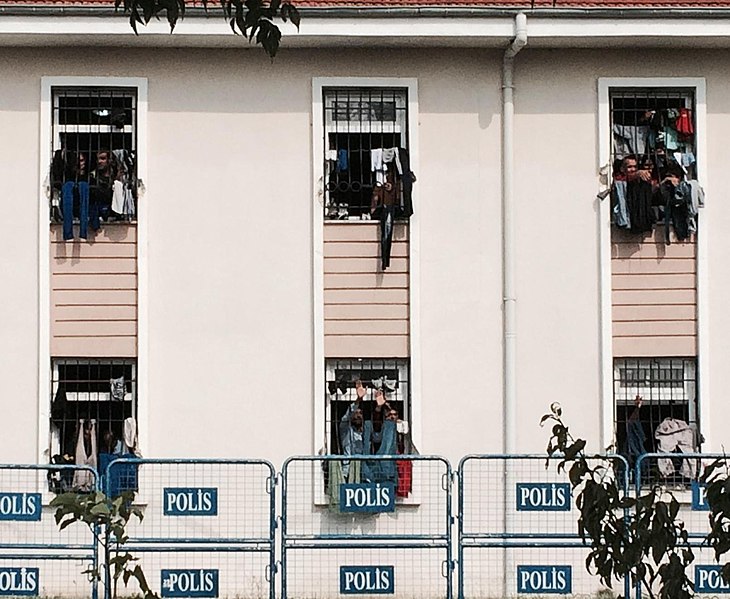Photo: Refugees at a detention centre in Edirne, Greece - Wikimedia Commons
The European Council has adopted a agreement reached on the final part of 'The New Pact on Migration and Asylum', which was proposed by the European Commission in 2020 to finally come up with clear rules on migration applicable to all member states. The agreement on the so-called Crisis Regulation contains rules that will apply when the European asylum system is faced with a disproportionate influx of migrants, as in 2015. In such a case, stricter measures are allowed, immediately raising questions about possible human rights violations. Only Poland and Hungary disagreed on the regulation, which was adopted by a majority vote. The New Pact comes at a time of rising tensions in Europe over migration and how to deal with it across Europe, with historically high numbers of people seeking to reach Europe. Current agreements do not seem to reflect this. The New Pact is meant to be a reform of the current agreement. It should enforce more solidarity between countries and distribute migrants equally, but the question is whether such a deal really lives up to its expectations this time.
A 'new' deal
The New Pact wants "a common approach to migration and asylum based on solidarity, responsibility and respect for human rights". In the new agreement, solidarity is mandatory but flexible: all countries must contribute but can decide how. The most logical thing would be to transfer migrants from countries of first entry to countries further into Europe. But countries can also decide to contribute only financially, in effect by buying migrants off - €20,000 per migrant to keep them in, say, Italy or Greece - completely dehumanising the issue. The possibility of paying in exchange for taking in migrants will increase the responsibility for countries at the border, putting even more pressure on their asylum procedures and controversial detention centres.
Veto is in the air
The upcoming elections in Poland raise a new question about European solidarity on migration. Alongside national elections, Polish voters face a referendum that essentially asks them whether they are for or against migration. The opposition has raised concerns about the referendum, saying the questions are phrased in a leading way. Poland's election campaign is dominated by the ruling PiS party, which calls for protecting Poland from illegal migration. "On 15 October, we can say no to illegal immigration and to the forced relocation of illegal immigrants," said Polish Prime Minister Morawiecki. Poland and Hungary have both announced they will veto the entire new pact. It shows that solidarity within the EU is still far away. Interests vary widely between member states. The Commission hopes to implement the New Pact before next year's European elections, as it fears the continent will take a turn to the right and the pact will disappear from view completely.
Hope for solidarity
The Common European Asylum System (CEAS) was established in 1999. It ensures that the EU acts as one when it comes to refugees and asylum. Placing responsibility with the EU as a whole requires solidarity among member states. However, asylum flows are not evenly distributed. Countries such as Greece, Italy and Spain are processing a disproportionate share of the 'flow'. Southern European countries have called for European action on migration flows, but they are not heard by the other countries. It shows the controversy between signing a deal promising intra-EU solidarity and the much harsher reality where self-interest seems to be paramount. The more northern countries seem to think that redistribution is voluntary, despite the fact that everyone is part of the Common European Asylum System. The New Pact should reform the system, but the deal again does not seem to have the support of all EU states. If some countries simply do not believe in a European asylum system - as Poland and Hungary have stated - a new deal will not make a difference.
Human rights violations
The EU's ad hoc crisis management has proved ineffective. Not only are migration rates not decreasing, the human rights situation is not in line with EU values. The dire situation in border countries created by the unwillingness of other EU countries to help and accept refugees encourages border countries to try to keep out as many migrants as possible. The pressure on their system forces them to act in inhumane ways, such as carrying out pushbacks, to "protect the European Union“.
This new pact is unlikely to change the human rights situation of migrants for the better. Because it does not force numbers down, people will continue to come to Europe no matter how dangerous. Pushbacks and violations during asylum procedures will continue to prevail because the new agreement does not address these issues. The Commission hopes that the agreement will lead to more solidarity will lead and reduce the asylum problem as a whole, but this line of thinking seems unfounded.
It is wishful thinking to expect a new agreement to completely change the mood within the EU. Solidarity cannot be guaranteed in an agreement if all countries are not behind it. To create an effective European asylum system, everyone must be on board, otherwise tensions between countries can spill over into other policy areas. Asylum is a fundamental right and a duty. The EU has a responsibility to stand together, respect human rights and act according to its own core values.





